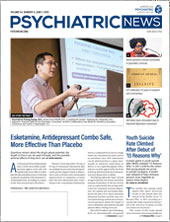Roughly 14,000 to 50,000 people are the victims of sex trafficking in the United States each year. Although sex trafficking cuts across racial boundaries, a disproportionate number of the victims are black females from low socioeconomic backgrounds, with most entering into the commercial sex trade before they are 15 years old. Presenters at the 50th Anniversary Conference of the Black Psychiatrists of America at National Harbor, Md., in April discussed how these women and girls are trafficked.
The session, titled “Human Trafficking in the Black Community: A Legal and Forensic Perspective,” was moderated by Danielle Hairston, M.D., an assistant professor and training director of the Psychiatry Residency Program at Howard University College of Medicine in Washington, D.C.
Rashida Wilson Prioleau, Esq., assistant attorney general in Washington, D.C., began the session with an overview of current laws designed to protect victims of sex trafficking, children in particular.
“These victims have been through layers upon layers of trauma, so protecting them is paramount,” Prioleau said. She added that a trend in legislation that shields victims from prosecution for crimes their traffickers forced them to commit reflects a shift in perspective away from punishment and toward rehabilitation for the victims. “If someone holds a gun to your head and says, ‘You have to [do this] right now or I will kill you,’ and you do it, do you think it’s fair for you to go to jail?”
Often victims of sex trafficking face such threats. For example, one participant in a study of trafficking victims had been shot in the leg on two separate occasions by her trafficker. The trafficker took the victim to the same hospital and both times offered the same explanation—drive-by shootings. Cases like this highlight the need for health care professionals to be aware of the risk factors and warning signs of trafficking, Prioleau said.
Katara Watkins-Laws, Ph.D., a staff psychologist at the Child Guidance Clinic at the Superior Court of the District of Columbia, described the road victims of sex trafficking unwittingly travel before exploitation. She cited the adverse childhood experiences many victims endure, such as sexual or physical abuse, parental substance use, exposure to domestic violence, life in a high-crime area, or exposure to gang activity.
These events can result in unmet needs in the victim for food, shelter, love, or acceptance. Traffickers sense those unmet needs and approach in the guise of kindness, Watkins-Laws said.
“There is a grooming period where unmet needs are exploited and highlighted. For example, someone is sexually abused for years, and [a trafficker] comes along and makes her feel beautiful. The bar is very low, like taking them to McDonald’s,” Watkins-Laws said. “As those needs are being met, trust is being built.”
Once trust is established, the trafficker begins to make requests, such as dancing for customers, and eventually the requests involve sex acts, Watkins-Laws said.
Traffickers will promise a better life while simultaneously isolating and manipulating their victims into depending on them, said APA Board Member Cheryl D. Wills, M.D., director of Child and Adolescent Forensic Psychiatric Services at University Hospitals of Cleveland, affiliated with Case Western Reserve University.
“They promise modeling or entertainment careers. But then they take away [the victims’] phones and internet. They take away identification cards and give them fake IDs to change their identity. They take away money and put them in an unfamiliar environment,” said Wills, adding that perpetrators often threaten victims with sleep or food deprivation if they do not comply.
“The outcome is submission. The victims identify with the aggressor or have Stockholm syndrome. They may not appreciate that they have been conned,” Wills said.
Many of the victims, especially young ones, do not see themselves as such, which can make it difficult to provide much-needed services, said Prioleau.
“It’s hard for us to help them and explain how they are victims because this is the only life [many of them] have known,” Prioleau said.
A trauma-informed approach to care is critical when working with victims of sex trafficking in any health setting, said Wills.
“They are unlikely to identify themselves to health care providers, and they are retraumatized [by this encounter] because history-taking is intrusive. Another issue is the intimacy of the exam,” Wills said. “Great care should be taken in maintaining trust, confidentiality, and the therapeutic alliance with the patient while also fulfilling legal responsibilities to the victims and society.” ■

